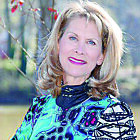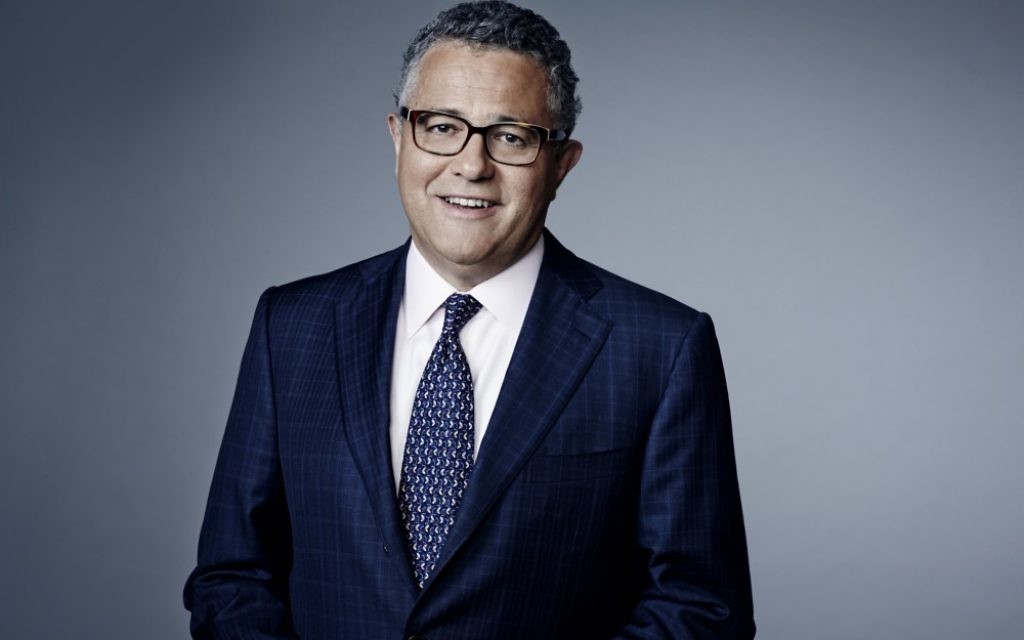Toobin Takes Us Back to Crazy ’70s with ‘Heiress’
New Yorker staff writer, CNN senior legal analyst and best-selling author Jeffrey Toobin returns to the Book Festival of the Marcus Jewish Community Center on Saturday night, Nov. 19, with his latest book, “American Heiress: The Wild Saga of the Kidnapping, Crimes, and Trial of Patty Hearst.”
Toobin talked about the book and Hearst in an interview with the AJT.
Editors note: Check out Marcia Jaffe’s review of the book below:
Get The AJT Newsletter by email and never miss our top stories Free Sign Up
Jaffe: After reading this book, will the reader go away with a conclusion about the extent of Hearst’s guilt?
Toobin: Ultimately, I want to leave those judgments to the reader, but I think there was abundant evidence to support the jury’s decision to convict Hearst of bank robbery.
Jaffe: During the Hearst trial, you note that her high-profile attorney, F. Lee Bailey, made some errors. Please elaborate.

Toobin: Bailey put Hearst on the stand without getting a clear ruling from the judge on the scope of permissible cross-examination by the prosecutor. When the prosecutor started asking about Hearst’s other crimes — besides the first bank robbery — disaster followed for the defense.
Jaffe: Did you attempt to get Hearst’s input for the book, and how did that go?
Toobin: I tried many time to get her cooperation, both directly and through intermediaries. I failed. Hearst is in her early 60s — a mother, a grandmother, a widow. She prefers not to revisit this whole period.
Jaffe: If this wild saga of kidnapping had occurred in 2016 rather than 1974, would it have played out differently in your eyes?
Toobin: Certainly the media coverage would have been greater. In 1974 there were just three half-hour evening news shows and one morning news show, “Today” (“Good Morning America” started in 1975). In a world without cable news, to say nothing of the Internet and social media, what qualified as big news then looks like just a smattering of attention today.
Jaffe: What one revelation did you discover that we baby boomers would find most intriguing?
Toobin: I thought the ’60s were the time of madness in the United States. But the ’70s were even crazier — with 1,000 political bombings a year in the United States, two hijackings a month, as well as Watergate and the energy crisis. The United States today is an island of stability compared to the ’70s.
Jaffe: How did you explain the kidnapping and crimes (detailed in your book) to your own children?
Toobin: My kids are in their 20s. They are smart, savvy adults who need no special handling.
Jaffe: With your genre of high-profile courtroom drama and analysis, what’s your next project? Casey Anthony? George Zimmerman? Oscar Pistorius (not our system of laws)?
Toobin: Not sure at this point. I’ll keep you posted.
Jaffe: Post-election, will you take on the new Supreme Court appointee as a topic?
Toobin: I will continue to write about the Supreme Court for The New Yorker. I’m not sure I have another Supreme Court book in me. I’ll need a lot more change on the court to make another book worthwhile.
Jaffe: You’ve been to Atlanta before; any observations or connections?
Toobin: CNN has moved its center of gravity to New York, but Atlanta remains the ancestral home of my network. I love going to CNN Center and seeing the tourists from all over the world visit. Atlanta is also the headquarters of CNN International, which has a dazzling collection of journalists from around the world.
Jaffe: Tell us something about you we don’t know. Hobbies, regrets, favorite things?
Toobin: I love golf. Anyone want to take me to East Lake — or Augusta National?
Jaffe: You have met famous people from Martha Stewart to Supreme Court justices. What one person would you like to meet in the future?
Toobin: The next three Supreme Court justices — so I get to know them before they go on the bench.
Jaffe: Is there anything in your Jewish upbringing (described as secular) that spills over into your legal analysis, work or lifestyle?
Toobin: My parents described themselves (accurately, I think) as more cultural than observant Jews. I’ve enjoyed learning more about the rituals as an adult. It’s so easy to be Jewish in my world (in New York, in the United States) that it’s important for me to remember that that is not the case everywhere, and collective vigilance is important around the world.
Review: Hearst Case: Lots of Questions, Little Certainty
We baby boomers remember our outrage, puzzlement and fear in 1974 when we witnessed Patty Hearst wielding that ominous machine gun during bank robbery footage. Especially because we knew her father could buy her a bank.
Senior CNN legal analyst Jeffrey Toobin, who similarly took on the O.J. Simpson trial, takes his best shot at the Heart case with “American Heiress: The Wild Saga of Kidnapping, Crimes and Trial of Patty Hearst.”
The New Yorker staff writer labels the saga as “defining an insane era in American history.”
Questions abound.
What was the Symbionese Liberation Army? Something with a real core or a bunch of half-baked radicals with a toxic mix of sex, politics and violence?
They were “an army” of six with nothing to liberate for their fake cause of Symbia; is that even a country? Note that feeding the hungry became a battle cry.
Did this wealthy young woman willingly make the stunning decision to join her captors? Is there a valid Stockholm syndrome in which a victim loses her sense of self and value system to “go along to get along”?
We saw her as both steely-eyed and terrified, the picture of a lock-jawed aristocrat and true to her own notes, quoted by Toobin: “After a couple of weeks, I started to feel sympathy with the SLA. … Beginning to see what they wanted to accomplish was necessary … although hard for me to relate to the tactic of urban gorilla warfare. … But how can someone disagree with wanting hungry people to have food?”
Toobin takes us along a journey whose ending we know. Hearst, who didn’t cooperate with the book, became deprogrammed, married a police officer (who died a few years ago) and now shows her shih tzus at the Westminster Kennel Club.
With his legal background, Toobin provides a front-row analysis of the trial, where famous criminal defense attorney F. Lee Bailey mistakenly allowed Hearst to take the stand. She went off script and said she “didn’t really resist her captors’ sexual advances.” Oops.
We see Hearst softening in jail as her family visits. She crochets scarves as she engages in chitchat about dogs and which cosmetics she needs brought to her. Toobin writes:
“In the closet she became a revolutionary. In the jail cell, she became a Hearst.”
Toobin, an expert on the U.S. Supreme Court and an Emmy winner for his work on the Elian Gonzalez saga, compiled meaningful photos, FBI reports, memoranda about trial strategies and the like for “American Heiress.”
The bottom line is Hearst’s felony murder conviction was commuted by Jimmy Carter, and she was pardoned by Bill Clinton. The reader will come away informed but maybe not with certitude.





comments